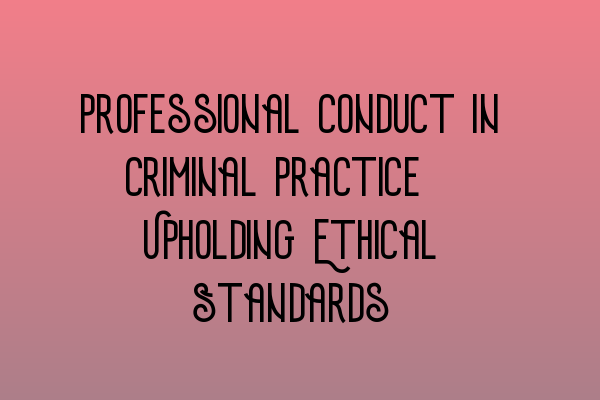Professional Conduct in Criminal Practice: Upholding Ethical Standards
As legal professionals, we have a crucial role to play in upholding ethical standards in the practice of criminal law. Our commitment to professional conduct is not only a requirement by the Solicitors Regulation Authority (SRA), but also essential for the confidence and trust of our clients and the proper functioning of the justice system.
What is Professional Conduct?
Professional conduct encompasses the set of rules and standards that govern the behavior and actions of legal professionals in their practice. It includes aspects such as honesty, integrity, confidentiality, competence, and maintaining the highest level of client care. Adhering to these principles is fundamental to maintaining the reputation and credibility of the legal profession.
Importance of Upholding Ethical Standards in Criminal Practice
In criminal practice, upholding ethical standards is of utmost importance due to the nature of the cases we handle and the potential consequences for individuals involved. As criminal lawyers, we have a responsibility to ensure fair representation, safeguard the rights of our clients, and uphold the principles of justice.
By maintaining a high level of professionalism and adhering to ethical standards, we contribute to the fair administration of justice. This, in turn, enhances public trust in the legal system and ensures that the rights of both the accused and the victims are protected.
Key Ethical Considerations in Criminal Practice
There are several key ethical considerations that criminal lawyers must be mindful of:
- Confidentiality: Protecting the confidentiality of client information is paramount. It is essential to maintain the trust clients place in us and respect their privacy.
- Conflict of Interest: We must avoid any conflicts of interest that may compromise our ability to represent our clients impartially. This includes avoiding situations where personal interests conflict with the interests of our clients.
- Due Diligence: Thoroughly investigating the facts of the case and ensuring accuracy in legal advice is imperative. Providing competent representation requires us to stay updated with the latest developments in criminal law.
- Advocacy: While advocating for our clients’ interests, it is essential to do so within the bounds of the law. Upholding the principles of fairness, honesty, and respect for the court is key to maintaining our professional reputation.
- Professional Courtesy: Treating colleagues, opponents, and court staff with respect and professionalism fosters a positive working environment and contributes to the efficient administration of justice.
Continuing Professional Development
To uphold ethical standards and provide the best representation, ongoing professional development is crucial. Staying updated with changes in legislation, legal precedents, and evolving ethical considerations enables us to effectively serve our clients.
There are several resources available to support our professional development, including SQE 1 Practice Exam Questions and SQE 1 Practice Mocks FLK1 FLK2 for practical assessment preparation. Additionally, SQE 2 Preparation Courses and SQE 1 Preparation Courses offer comprehensive training to enhance our legal knowledge and skills.
Conclusion
Upholding ethical standards in criminal practice is not an option, but a professional obligation. By maintaining the highest levels of professional conduct, we safeguard the rights of our clients, contribute to the proper functioning of the justice system, and earn the trust and respect of our profession and the public.
To stay up to date with the latest SRA SQE Exam Dates, it is essential to regularly check SRA SQE Exam Dates. Ensuring compliance with exam requirements is crucial for continued professional growth and success.
